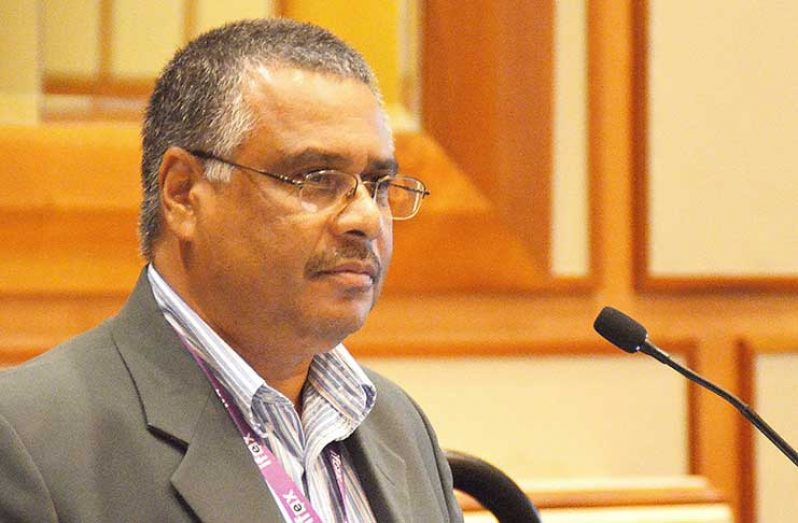THE Association of Caribbean Media Workers (ACM) is looking to introduce new scientific parameters to assess press freedom in the region, president of the association, Wesley Gibbings has said.
Gibbings made this announcement last week during his visit to Guyana to launch two booklets on information about Guyana’s Parliament. The project was a collaborative one between ACM and the Parliament of Guyana, with funding from the Canada Fund for Local Initiatives (CFLI) and the High Commission of Canada to Guyana. “…at ACM there is strong advocacy for developing our own benchmarks and parameters for assessment.
We can look forward in the near future, from the ACM, a suggestion for setting ourselves new and different benchmarks for assessing freedom of the press” the association’s president said.
Gibbings explained that at this point in time, ACM participates in the tabulation of information which feed into assessments done by international agencies such as Reporters Without Borders (RSF).
RSF provides an annual analysis of press freedom in 180 countries. In its 2017 Press Freedom Index, Norway was ranked number one with a score of 7.60, while North Korea was ranked last with a score of 84.89. In the region, Jamaica was the highest ranked country coming in at number eight, while Guyana was deemed one of the poorer performing countries having dropped from 57 in 2016, to 60 this year.
Within that bracket, Suriname came in 20th, Trinidad and Tobago 34th and the Organisation of Eastern Caribbean States (OECS) trailing at 38th. To compile the Index, RSF has developed an online questionnaire with 87 questions which focus on several criteria. These include: pluralism, media independence, environment and self-censorship, legislative framework, transparency, infrastructure and abuses.
But according to the association’s president, while RSF provides a “fair outlook” of what the media environment is like, “they don’t go far enough”. Explaining this, Gibbings said that if the region were to start employing its own parameters, it may reveal that the region is not in such a good situation as some international agencies portray. He said that this is because those parameters would factor in nuances in terms of the cultural issues that impact on media performance.
For instance, he pointed to the fact that when these agencies examine “attacks on journalists,” they pay heavy attention to physical attacks, which includes kidnappings, persecution by the government or arrests, and whether they have been killed.
And this is exactly the case. RSF on its website explains that the data on abuses is compiled by a team of specialists, where each person who is assigned to a different geographical region, keeps a detailed tally of abuses and violence against journalists and media outlets.
The ACM president recalled that one of the earlier questionnaires done by an agency had asked “how many Caribbean journalists have been killed?” He said that in such cases, it is extremely difficult to respond in a way that appears serious, since attacks on journalists in the Caribbean are far more subtle.
“I make the point time and time again that our journalists aren’t killed but many stories die. So what is the objective of putting a journalist out of commission? So if you can achieve that without having to kill or kidnap or assault a journalist, then you achieve the same objectives but by different means” the ACM president offered. He added that what has been discovered in the region is that enemies of the free press find other ways to silence journalists. As such, he noted that greater attention must be given to the development of scientific parameters to be able to better assess the state of press freedom of the region.
Asked about the capacity of the region at this point in time to introduce such a system, Gibbings assured that “at this point, we can develop our own scoring system”. He said that he has since spoken to some international agencies about such a scoring system and they have acknowledged the need for a more “culturally sensitive approach” to it. “Our cultural antecedents make us people who speak our minds freely. We have cultural products [like] calypso and other [art] forms that are very open and these stretch free expression to the limits. And we see these things and say ‘yes we do have freedom of expression,’ but then we need to look deeper than that. But that kind of examination would call for a little more science” he offered.




.png)









